Serendipity in South Kivu
BUKAVU, Democratic Republic of Congo, April 1, 2015 – The ferry trip from Bukavu to Goma is a real journey into Congolese society. I moved to Kinshasa a month ago as an independent photojournalist, and I was wrapping up my first trip outside the capital, as part of an AFP team travelling into the restive east.
I set about exploring the boat inside out, to observe the differences between the classes, the sailors and passengers. I spent time with everyone I came across. A few minutes with the mechanics in the oily, noisy engine room. Then off to hang out with the chefs in the kitchens of the first and second classes.
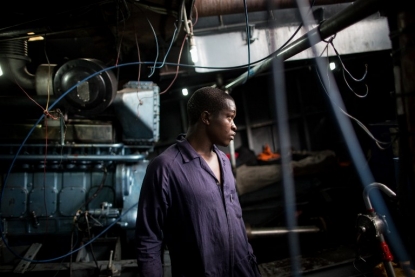 A mechanic in the engine room of a ferry on Lake Kivu on March 26, 2015 (AFP Photo / Federico Scoppa)
A mechanic in the engine room of a ferry on Lake Kivu on March 26, 2015 (AFP Photo / Federico Scoppa)In the main fourth class lounge, I saw a man addressing the other passengers. I don't speak Swahili, but soon realised he was a preacher delivering a sermon. His flock seemed happy to know God was by their side for this trip.
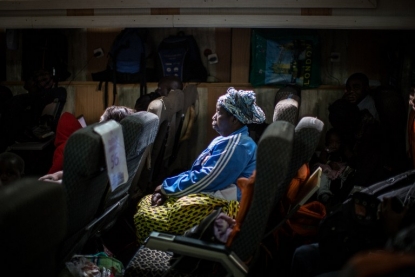
A passenger listens to a preacher deliver a sermon on the fourth class deck of a ferry linking regional hubs Goma and Bukavu,
in the eastern DR Congo on March 26, 2015 (AFP Photo / Federico Scoppa)
From there I made my way up to the first-class top deck. Quite a different scenario: 15 or so passengers sipping sodas, taking photos of the lake, playing on their smartphones, chatting and eating the lake fish I had seen few minutes earlier in the hot kitchen of the lower deck.
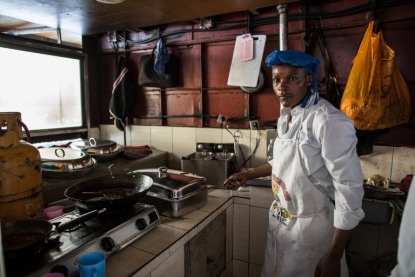 In the first class kitchen of a ferry crossing Lake Kivu on March 26, 2015 (AFP Photo / Federico Scoppa)
In the first class kitchen of a ferry crossing Lake Kivu on March 26, 2015 (AFP Photo / Federico Scoppa)Our journey into South Kivu was supposed to last two weeks. Except my cameras were confiscated in Kinshasa the day before our departure and it took me five lost mission days to get them back… I finally flew with my equipment to Goma, right on time to board a small, fast boat to Bukavu on the southern shore of Lake Kivu.
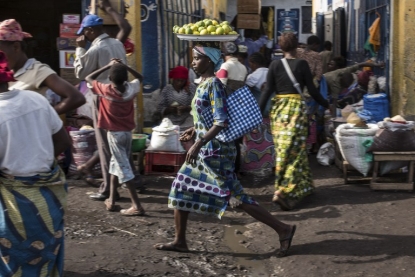 A street vendor in Goma on March 26, 2015 (AFP Photo / Federico Scoppa)
A street vendor in Goma on March 26, 2015 (AFP Photo / Federico Scoppa)There I joined my teammates on the assignment, AFP’s Kinshasa bureau chief Marc Jourdier, the video journalist Kathy Katayi, and Bukavu correspondent Jean-Baptiste Baderha. I was constantly on the look-out for images as we headed south to the banks of Lake Tanganyika, and almost all my shots were taken on the spur of the moment. Waking up in the lakeside town of Uvira, I spotted from the window of my hotel room some fishing boats approaching the shore. I grabbed my cameras and ran down to the beach. Early morning light, traditional boats and children playing made for a magical combination.
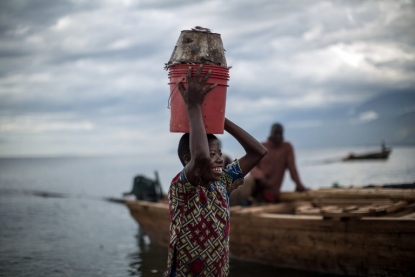 A child carries a bucket of fish in Uvira on the shores of Lake Tanganyika on March 22, 2015 (AFP Photo / Federico Scoppa)
A child carries a bucket of fish in Uvira on the shores of Lake Tanganyika on March 22, 2015 (AFP Photo / Federico Scoppa)Some days later, we were driving from Baraka to Fizi, further down the shore of the lake, when we came across an overflowing river. Bicycles, motorbikes and the few car drivers had to stop to wait their turn, so I jumped out of our vehicle to stretch my legs and shoot some pictures of people wading through the water. When our turn came to cross, I returned to the car. At that very moment a man lost control of his bike loaded high with hay, it tumbled into the flooded ditch and settled in a crazy position, right in front of us.
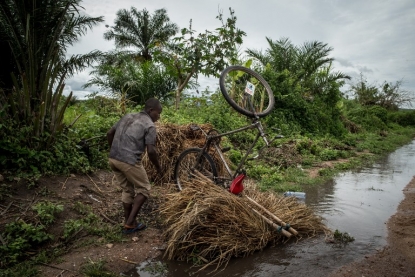 On the road from Baraka to Fizi, South Kivu, on March 24, 2015 (AFP Photo / Federico Scoppa)
On the road from Baraka to Fizi, South Kivu, on March 24, 2015 (AFP Photo / Federico Scoppa)South Kivu at first glance is a place of beautiful countryside, lush green mountains, peaceful lakes and splendid panoramas. But everyone living here has stories to tell of the atrocities perpetrated in the region during decades of strife.
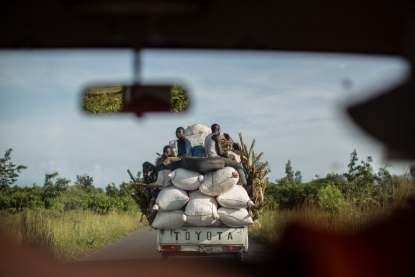 On the road to Uvira on the shores of Lake Tanganyika on March 21, 2015 (AFP Photo / Federico Scoppa)
On the road to Uvira on the shores of Lake Tanganyika on March 21, 2015 (AFP Photo / Federico Scoppa)Speak with them, and they soon bring you back to the sad reality: this is a deeply unstable region, wracked by violence from militiamen-turned-highway-bandits and conflicts between ethnic groups, armed factions and the army that are far from solved.
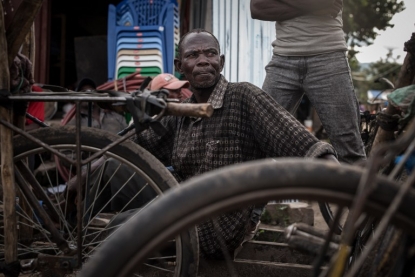 A bicycle taxi driver in Baraka, South Kivu on March 23, 2015 (AFP Photo / Federico Scoppa)
A bicycle taxi driver in Baraka, South Kivu on March 23, 2015 (AFP Photo / Federico Scoppa)One day we stopped by the village of Mutarule, where I photographed a small cemetery covered with tiny, delicate pink flowers, and 32 white crosses marking the graves of victims of an interethnic killing spree just under a year ago. There is never far to look, in South Kivu, for traces of violence past.
Federico Scoppa is an independent photographer and AFP contributor based in Kinshasa. Find more examples of his work here.
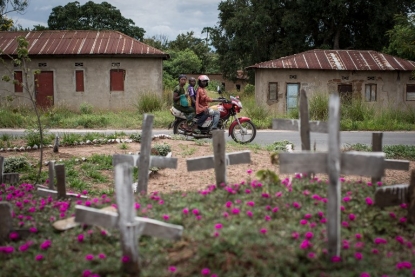 Crosses mark the graves of 32 victims of interethnic violence in the South Kivu village of Mutarule (AFP Photo / Federico Scoppa)
Crosses mark the graves of 32 victims of interethnic violence in the South Kivu village of Mutarule (AFP Photo / Federico Scoppa)

